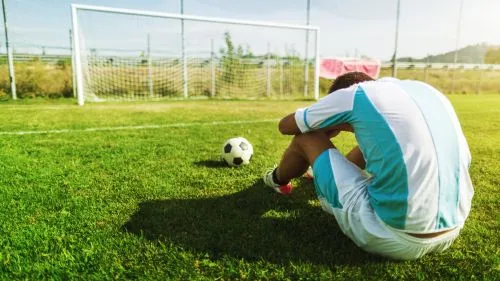As an athlete, your mind is shaped by every game you’ve played, every mistake you’ve made, and every injury you’ve endured. Those moments—especially the tough ones—don’t just disappear. They can linger beneath the surface, quietly influencing how you think, feel, and perform in future competitions.
In this article, we’ll explore how your past experiences, both on and off the field, can impact your performance today, why this happens, and a practical exercise you can use to break free from the hold they may have on you.
Why Past Performances Matter
This idea—having our past performances impact our future performance—is an important one for us to examine as athletes.
You might be playing with fear, for example, and really be wondering: Why am I so afraid of performing poorly? I know that nothing can really happen to me. Maybe coach yells at me, maybe we lose, but I’m not going to physically get hurt. So why am I experiencing so much fear?
Well, if we were to take a look back through your past experiences, maybe we would land on a game—possibly even a year ago—that was very negative. Maybe you made a mistake or a few mistakes. Maybe your coach got mad at you, maybe your team lost, and then maybe coach screamed at you after the game.
All of that led to this intensely negative experience for you. When something like that happens to you as an athlete, that leaves an imprint on your mind—specifically on your subconscious mind.
Moving forward, that past experience can affect our future performances, to where we’re playing with more fear—not for any other reason than the fact that we don’t want to experience all those negative emotions again.
How Past Injuries Impact Future Performances
In addition to having a negative experience in the past where you made a mistake or had a bad performance, we could also see the past experience of an injury affect you in a similar way.
With an injury, there’s both the physical pain and the emotional frustration involved—whether it’s the pain of the injury itself or the pain of missing games and going through the recovery process.
In one-on-one coaching, I’ve worked with a lot of players coming back from injuries. Probably one of the toughest to return from is an ACL tear, where surgery is required and recovery takes months.
When I’m working with a player like that, one of the things we have to make sure of is that when they do return to play, they aren’t playing too timidly or holding themselves back because they’re afraid of reinjuring themselves—not just because the injury hurts, but because they know it’s a long, grueling process that could cost them a season or more.
The pain, frustration, and negative emotions attached to the recovery process can stick with us, leading us to play it safe, play timidly, and hold ourselves back.
Situations Where This Shows Up
Whether it’s because of a negative performance or an injury, past experiences can stick with us and impact our performance in the future.
Sometimes this is very situational:
-
A catcher makes a bad throw back to the pitcher and a run scores. Now they fear and struggle to make throws back to the pitcher.
-
A basketball player misses a couple shots late in the game, gets yelled at by the coach, and now hesitates to shoot.
-
A golfer misses a three-foot putt to win a tournament, and now struggles with short putts in the future.
These moments become linked to fear and anxiety. Recognizing that connection is the first step in overcoming it.
Processing Past Experiences
The reason we want to be aware of how past experiences impact future performances is because it helps us understand what’s driving our fear and anxiety. Once we know, we can work through it and use sports psychology tools to help us in similar situations in the future.
When it comes to working through these past experiences, it’s best to do so with a professional—such as through mental performance coaching or therapy.
But I want to give you an exercise you can do on your own to start processing that past experience.
The Writing Exercise
-
Think Back: Identify a situation from your past where you struggled—either a bad game or an injury—that you believe is currently affecting your performance. If you’re not sure, think of any intensely negative experience (coach yelling at you, losing an important game, etc.).
-
Write It Out: Spend 10–20 minutes in a safe space writing about what happened. Include how it hurt, what you feared, how you thought others viewed you—anything that comes to mind. Don’t censor yourself. Let your writing guide you.
-
Repeat for a Few Days: Over the next several days, repeat the process. Don’t read your earlier writing—just write it again from memory. This repeated exposure helps you process the experience.
When we avoid thinking about a negative moment, it stays emotionally charged. By processing it, we reach a point where thinking about it no longer triggers us.
Moving Forward
You can’t change what’s happened in the past, but you can change how emotionally attached you are to it.
Once you’ve processed it, recognize when it’s been affecting you in games—not as an excuse, but as a signal that it’s time to focus on how you want to play moving forward.
This is where tools like positive self-talk and focusing on controllable objectives come into play. But it starts with processing the past.
If you want more one-on-one help processing a past experience, there are many techniques we can use in mental coaching. To learn more about my coaching program, click here to schedule a free introductory call.
I’ve also created two online courses:
And if you’re more of a reader, check out my books:
Thank you for reading and I wish you the best of success in all that you do.




